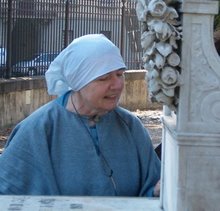Melchisadek, King of Righteousness, greeted the nomadic cattle-herding invader Abraham from Ur of the Chaldees to Salem, Jerusalem, meaning Vision of Peace, with the gifts of bread and wine, for his Palestinian people were peaceable agriculturalists. I had been taught his story by a beautiful nun in school in Sussex, then travelled to Australia to be taught it again, more deeply, by Aborigine explaining that the Joshua model of conquest and slaughter is less desirable than the Melchisadek model of the sharing of skills for human survival. Jesus in the Galiliee region would have seen Mary bless the Sabbath candles, Joseph the bread and wine, on Friday at sundown, the Sabbath Eve, the Melchisadek rite shared from the indigenous people with the laity, rather than the cattle slaughtering and the bartering of the Temple with its Aaronic priests and Levites. The Epistle to the Hebrews, perhaps written by Prisca/Priscilla, for its Greek is certainly not Paul's, stresses the one High Priest Melchisadek as the Messiah of Justice. Jesus in the Gospels listens to the voices of those outside of power, Samaritans, Syro-Phoenicians, women, lepers, cripples - and restores them to health, to power-sharing. For this he is unjustly crucified. But a Melchisadek Christianity, a Melchisadek Judaism, would listen to the indigenous voices, to the feared, hated Others, sharing with them the Thanksgiving Feast, the Eucharist. This our library and our cemetery seek to do, with books on those outside of power and subjected to Holocausts, Aborigine, Native American, African American, Roma, Jew, Women, with work for Roma families to whom no one will give work, with listening to the voices of Maori, Amerindian, even recording them, and many others, to all who come here, celebrating a rich and compassionate humanity. We are the World's citizens, mending the cracks in it.



